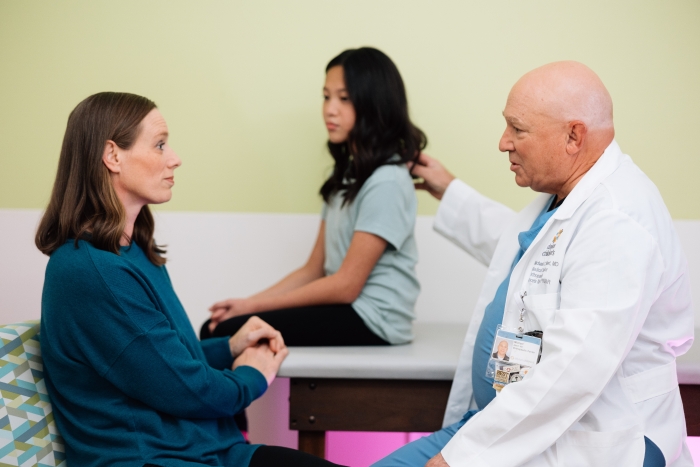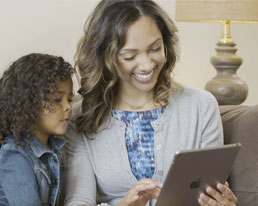pediatric spinal care
what is scoliosis? | types and signs of scoliosis | treatment
We understand that learning your child may have scoliosis can feel scary or overwhelming. At Dayton Children’s, we know what matters most to your family in this moment: answers, options and an expert, personalized approach to your child’s care.
With state-of-the-art technology and compassionate care, we work closely with families to ensure the best outcomes for your child. Rest assured, you're not alone—together, we’ll navigate this journey and find the best solutions for you and your family.

 what is scoliosis?
what is scoliosis?
Scoliosis is a condition that causes a sideways curve in the spine. While many people have small curves that are not noticeable, scoliosis can cause larger curves that may affect a child’s appearance or cause discomfort. It’s most common in children and adolescents and can worsen during growth spurts.
The shape of the spine in scoliosis often resembles the letter "C" or "S”.

 types of scoliosis:
types of scoliosis:
- Idiopathic scoliosis: This is the most common type of scoliosis. Kids can get it at any age, but most of the time it happens around puberty when a child goes through a growth spurt. Experts don't know exactly why this type of scoliosis develops, but it runs in some families.
- Congenital scoliosis: This type of scoliosis happens when something goes wrong with the way some of the vertebrae developed while a baby was in the womb. The problem might not be noticed until a child goes through a growth spurt, usually around age 2 or between ages 8 and 13.
- Scoliosis caused by a medical condition: Some kids develop scoliosis because they have a long-term medical problem that affects the muscles or skeletal system. For example, kids with muscular dystrophy, cerebral palsy, Marfan syndrome, or osteogenesis imperfecta may get scoliosis. Kids who have had tumors or growths on their spine may also develop scoliosis.
In 90 percent of cases, curves are mild and do not require active treatment but should be monitored for change by your child’s pediatrician or a spine specialist.
signs of scoliosis:
Scoliosis can be tricky to spot in the early stages becauses it's often painless. however, some signs may indicate your child should be evaluated, including:
- Uneven shoulders: One shoulder may be higher than the other.
- Uneven hips: One hip might sit higher than the other.
- Ribs that stick out: A noticeable rib hump, especially when bending forward.
- Head not centered: Your child's head might not align with the rest of the body.
- When bending over (back is flat), one side of the back may appear higher than the other.
If you notice any of these signs, it's a good idea to schedule an appointment with your child's doctor to follow-up.schedule now
how is scoliosis diagnosed?
Your child’s pediatrician will begin checking for scoliosis during their annual well-child visits by doing a physical exam and asking your child to bend over to check the curve of their spine. If your child is in middle school, they may be screened for scoliosis at school, although these screenings are no longer required in Ohio.
If a curve is detected, your child’s doctor may request an X-ray to confirm the diagnosis and measure the degree of the curve. These tests will help determine whether treatment is needed and what the best course of action might be.
 how is scoliosis treated?
how is scoliosis treated?
Small curves usually don't cause problems, but a curve that gets progressively worse over time can be bad for a child’s health. Very large curves can damage the joints and cause arthritis of the spine, which can be painful. In rare cases, untreated scoliosis can cause problems with a child’s lungs or heart.
If it looks like scoliosis could cause health problems, doctors will treat it with a back brace to prevent it from getting worse. In some cases, kids may need surgery to correct their curve.
 surgery
surgery
Dayton Children’s is a destination for families seeking innovative, personalized approaches to their child’s scoliosis surgery. The spine team at Dayton Children’s offers minimally invasive surgical options, like ApiFix and Band Loc procedures, with a goal to reduce pain, decrease hospital stays and speed up recovery. We know that kids just want to get back to being kids. The Dayton Children’s team is committed to helping kids that require surgery for scoliosis get back to school and sports as quickly and safely as possible.
choosing Dayton Children's for your scoliosis care
Our team of pediatric orthopedic specialists is dedicated to providing the best care for your child. Whether it’s the early stages of scoliosis or you’re navigating treatment options, we’re with you every step of the way. If you have any concerns about your child’s spine, you can schedule an appointment online with one of our spine experts.schedule now





